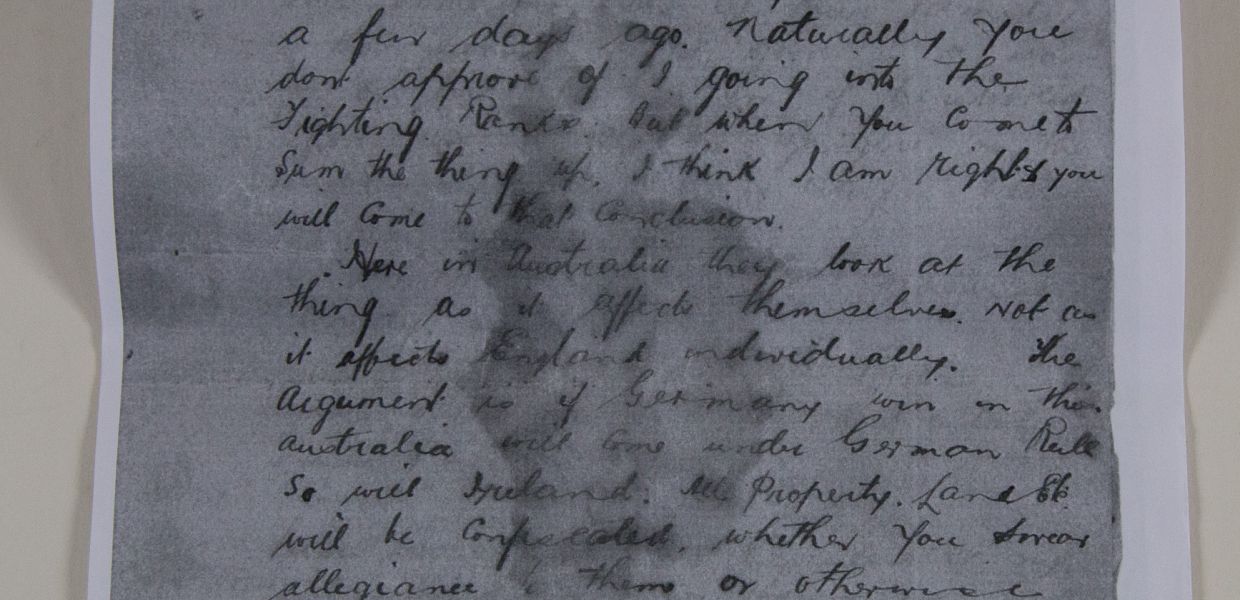Call for updated copyright rules to help transform the world with culture

A young soldier’s letter to his mother, a virtual exhibition on the history and meaning of cake, Wikipedia entries created as part of a Wiki edit-a-thon on European fashion; these are just some of the diverse cultural content available to everyone online. However, for everything that is relatively easy to share, use and re-use, there is also a wealth of cultural heritage that is not currently visible. One of the reasons we cannot easily engage with and share all cultural content online is due to current European copyright rules.

A soldier's letter to his mother at home in Ireland. Contributed to Europeana 1914-1918 by Aileen Unger, CC BY-SA
Back in June, we updated you on some of the work Europeana has been doing to represent cultural heritage organisations at a European government level to reinforce the issues the cultural heritage institutions have with the current EU copyright framework.
As custodians of in-copyright works, institutions face the time-consuming and often impossible task of obtaining copyright permission, whilst also managing the public’s expectations to provide online access. We do not want to undermine the ability of creators, publishers or intermediaries to earn a living from their creativity but simply want to make it easier to provide online access to works which will encourage and inspire new creative opportunities.
To recap, we developed an approach for working with MEPS that was based on three main requests. The draft report on the implementation of the 2001 EU copyright directive should include language that would:
- make it easier for cultural heritage institutions to digitise the works that they have in their collections;
- make it easier for cultural heritage institutions to make available online those works in their collections that are not in commercial circulation or otherwise actively managed anymore;
- allow libraries to electronically lend all works contained in their collections (commercially available or not) as long as they pay compensation to the rights holders.
In its evaluation report published before the summer, the European Parliament clearly recognised the current issues that the existing copyright rules present for institutions. This report was directly influenced by the case for change Europeana has been making on behalf of the cultural heritage institutions in its Network.
Now it is clear that the European Commission is committed to modernising EU Copyright rules as part of its strategy to create a Digital Single Market for Europe, it is essential that we continue to influence and best represent the interests of our Museums, Libraries and Archives to enable us to provide access to information, culture and our shared European history online.
To help keep the momentum building and to best represent the real value in updating copyright rules, Europeana has worked collaboratively with heads of major cultural heritage institutions from across the EU. Together, we have written an Open Letter strongly in favour of updated copyright rules, addressed to Commissioner Oettinger, Vice President Ansip and Commissioner Navracsics. This represents Museums, Archives and Libraries in specific areas of making online access easier but also aligns with the efforts of others from across the cultural heritage sector in related areas such as extended collective licensing.The letter, which is available in a number of European languages, was initially signed by 30 key signatories from major cultural heritage institutions from 11 member states.
Europeana’s Open Letter has now been published online and support is growing daily. To continue to make our voices heard by policy makers and to help influence the need for updated copyright rules,we want as many individual cultural institutions to sign as possible so would greatly appreciate if you could encourage your director to add their name in support.
